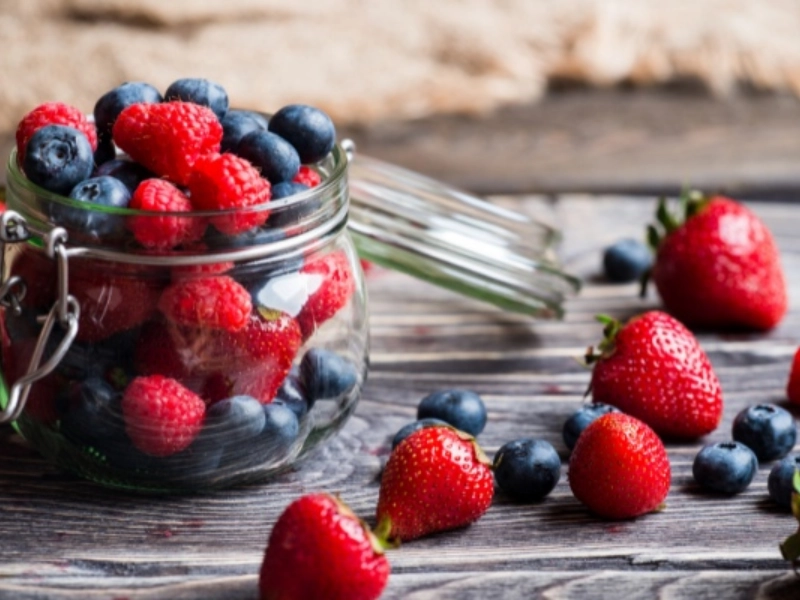Berries For Brain Health: Using Them to Naturally Boost Cognitive Function
Berries have anti-inflammatory and abundant antioxidant qualities. These characteristics may aid in preventing oxidative stress and neuro-inflammation, both of which are connected to cognitive loss. Berries include anthocyanins, which have been shown to enhance brain and vascular blood flow. Observational research, like the Harvard Nurses' Health Study, which indicates that berry and nut eaters have slower rates of cognitive decline, confirm these dietary benefits.
Antioxidants

Phenols
 Berries are loaded with advantages for the brain because they include flavonoids, a class of plant compounds. Particularly in blueberries, anthocyanins have a favourable impact on the parts of the brain linked to intelligence and memory. These phytochemicals also guard against oxidative stress and inflammation and enhance brain cell-signaling.
Researchers found that individuals who drank a drink that resembled blueberry juice fared considerably better on a series of memory tests than those who did not drink the beverage in a recent study that was published in the journal "Psychiatry Research". The participants' daily consumption of blueberries, which had high anthocyanin content, is credited by researchers with this outcome.
The anthocyanins in blueberries not only enhance cellular signalling and reduce oxidative damage, but they also enhance cerebral and vascular blood flow, which enhances cognitive function. Although consuming more berries can help you maintain your mental health, it's crucial to have a well-rounded strategy that takes sleep, exercise, good eating, and other aspects into account.
Berries are loaded with advantages for the brain because they include flavonoids, a class of plant compounds. Particularly in blueberries, anthocyanins have a favourable impact on the parts of the brain linked to intelligence and memory. These phytochemicals also guard against oxidative stress and inflammation and enhance brain cell-signaling.
Researchers found that individuals who drank a drink that resembled blueberry juice fared considerably better on a series of memory tests than those who did not drink the beverage in a recent study that was published in the journal "Psychiatry Research". The participants' daily consumption of blueberries, which had high anthocyanin content, is credited by researchers with this outcome.
The anthocyanins in blueberries not only enhance cellular signalling and reduce oxidative damage, but they also enhance cerebral and vascular blood flow, which enhances cognitive function. Although consuming more berries can help you maintain your mental health, it's crucial to have a well-rounded strategy that takes sleep, exercise, good eating, and other aspects into account.
Vitamin C
 Vitamin C is a naturally occurring nutrient that does much more than just shorten colds; our brain uses it like crazy. It is required for the creation of some neurotransmitters, shields the myelin sheath, which facilitates impulse transmission and improves memory, and, by lowering oxidative damage, delays the onset of premature ageing.
In addition to being an antioxidant, vitamin C also neutralises renegade oxygen molecules that harm cells and lead to cellular degeneration by giving up electrons. In one study, participants who had higher blood concentrations of vitamin C performed better on a memory test than those who had lower quantities.
Among the foods high in vitamin C include peppers, tomatoes, and berries. Nitrates, found in beetroots, have the ability to widen blood vessels and increase the amount of oxygenated blood that reaches the brain. Oranges and leafy greens are also excellent providers of vitamin C. Other foods that naturally promote cognitive performance include avocados, which provide a healthy amount of monounsaturated fat and improve mental vigour; mint, which boosts blood flow to the brain and helps focus; and rosemary, an essential oil that improves memory.
Vitamin C is a naturally occurring nutrient that does much more than just shorten colds; our brain uses it like crazy. It is required for the creation of some neurotransmitters, shields the myelin sheath, which facilitates impulse transmission and improves memory, and, by lowering oxidative damage, delays the onset of premature ageing.
In addition to being an antioxidant, vitamin C also neutralises renegade oxygen molecules that harm cells and lead to cellular degeneration by giving up electrons. In one study, participants who had higher blood concentrations of vitamin C performed better on a memory test than those who had lower quantities.
Among the foods high in vitamin C include peppers, tomatoes, and berries. Nitrates, found in beetroots, have the ability to widen blood vessels and increase the amount of oxygenated blood that reaches the brain. Oranges and leafy greens are also excellent providers of vitamin C. Other foods that naturally promote cognitive performance include avocados, which provide a healthy amount of monounsaturated fat and improve mental vigour; mint, which boosts blood flow to the brain and helps focus; and rosemary, an essential oil that improves memory.
Fibre
 It has long been established that a diet high in fibre supports appropriate cholesterol and blood sugar levels, both of which are critical for brain function. A high-fiber diet may help prevent brain inflammation by preventing the synthesis of substances that promote inflammation, according to recent studies.
Pectins, gums, and mucilages, which are soluble fibre, nourish the beneficial bacteria in the gut, assisting in the production of butyrate and other short-chain fatty acids that lower inflammatory indicators in the brain and increase brain-derived BDNF activity. Nuts, legumes, and whole grains all contain soluble fibre, which is necessary for preserving a balanced gut flora.
Carnosic acid, which is present in rosemary, improves cognitive function and shields the brain from oxidative damage. Try frying with rosemary oil or tossing salads with fresh herbs. Monounsaturated fats found in avocados promote brain health and enhance memory. They are also a good source of potassium, folate, and vitamin C. Use them in a green salad or blend them into smoothies.
It has long been established that a diet high in fibre supports appropriate cholesterol and blood sugar levels, both of which are critical for brain function. A high-fiber diet may help prevent brain inflammation by preventing the synthesis of substances that promote inflammation, according to recent studies.
Pectins, gums, and mucilages, which are soluble fibre, nourish the beneficial bacteria in the gut, assisting in the production of butyrate and other short-chain fatty acids that lower inflammatory indicators in the brain and increase brain-derived BDNF activity. Nuts, legumes, and whole grains all contain soluble fibre, which is necessary for preserving a balanced gut flora.
Carnosic acid, which is present in rosemary, improves cognitive function and shields the brain from oxidative damage. Try frying with rosemary oil or tossing salads with fresh herbs. Monounsaturated fats found in avocados promote brain health and enhance memory. They are also a good source of potassium, folate, and vitamin C. Use them in a green salad or blend them into smoothies.










